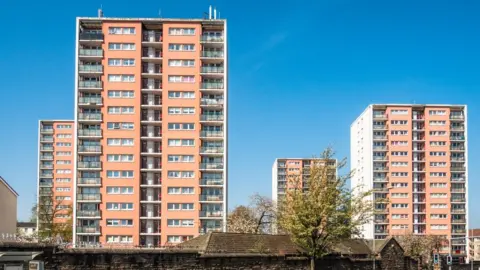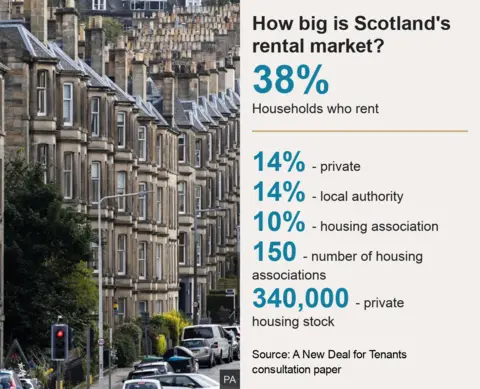Rent freeze plan is headline-grabbing ploy, says letting boss
 Getty Images
Getty ImagesFreezing rents for tenants in Scotland was a "headline-grabbing statement" by "people who don't understand the market", says a letting agency boss.
Nicola Sturgeon announced the measure on Tuesday as part of efforts to help people struggling with rising bills.
Brian Gilmour, whose company manages around 200 private lets, said the plan would see landlords forced to "pay for the government to look good".
A failure to fund enough social housing was "the nub of the issue", he said.
The first minister confirmed that emergency legislation would be tabled at Holyrood to protect tenants in private and socially rented homes, including a moratorium on evictions during the winter.
The rent freeze will run until at least the end of March next year, with housing secretary Shona Robison suggesting a cap could be applied on social rents after that point.
The Scottish Property Federation warned the move could "derail efforts to improve the supply of new, purpose-built homes for rent", while housing associations fear it will make it harder for Scotland to meet affordable house-building targets.
Mr Gilmour told the BBC Radio's Good Morning Scotland programme that the policy was "reflective of people who make a decision that grabs a headline who don't understand the market-place they are talking about".
Landlords already need to give three months' notice to tenants if they are going to increase rent, he pointed out, "and if the tenant feels the rent increase is disproportionate, they can appeal against it".
"For me, it just a headline-grabbing statement that is getting private landlords, and social landlords, to pay for the government to look good," he said.

Mr Gilmour argued that landlords also have to deal with rising costs, with increases in interest rates affecting mortgages, along with higher costs for buildings insurance.
They will now not be able to pass on such cost increases, he said, adding that many people who rent out properties are private individuals, "not some multi-national company making a fortune".
"What about the private landlord who is a retiree and this is part of their pension planning?" he asked.
"What is happening to them about their increasing costs they can't pass on? They're not some international conglomerate who can absorb the costs."
While some landlords have suggested they would rather their properties lay empty, or would consider selling, as a result of the plan, Mr Gilmour said it was "largely an empty threat".
"It's driven by the fear that someone could move into a property tomorrow, their first rent is paid in advance, but then they decide to not pay, and the landlord can't do anything about it, because of the additional part about no evictions," he explained.
"Yes, we have a cost of living crisis but I can't go to Morrisons, stock my trolley full of shopping and then go to the till and say, 'Sorry, cost of living crisis mate', then walk out the door.
"But I can get my keys to a £150,000 asset and say 'there's a cost of living crisis, I'm not paying my rent', and nobody can do anything about it."
The failure of "multiple political parties" not to sufficiently fund the building of affordable homes was at the heart of the issue, Mr Gilmour insisted.
He said about 150,000 people are on affordable housing waiting lists, but only 5,133 affordable/social houses a year on average have been built in Scotland over the last five years.
The Scottish government said in December it plans to deliver 110,000 affordable homes by 2031/32, with the aim that at least 70% of those homes will be for social rent.
"Private rents have only gone up for one reason and that is supply and demand," he added. "We have a lack of supply and if we have not been building the affordable housing then the private rental sector becomes an essential part of that supply mechanism.
"All you are doing if you put obstacles in the way is compounding that problem because, unless you are going to put billions - multiple billions - into the social rented sector to massively increase the supply, you are always going to need a private rented sector."
Landlords complained they had not been consulted on the plans, but housing secretary Ms Robison said the government was "very mindful of not doing anything that would inadvertently drive up rents in advance of any announcement".
She told Good Morning Scotland it was not "an unreasonable thing to ask" landlords, in the current emergency, to "play their part by containing rents at existing levels".
"Social rents are much lower than the private rented sector but we want to work with the social housing sector to discuss what happens after March next year," she said.
"We will be discussing whether a cap should be applied on social rents, and what level that should be at. We thought it was fair this applied to both sectors, but they work in different ways and we have to take that into account when taking this forward."

What do renters think of the government's plan?
Tommy, from Greenock, has lived in social housing all his life. He says he "wasn't impressed by the first minister's announcement".
"With the vast majority of social housing - either housing associations or council - the rents don't go up until 1 April," he told BBC Radio Scotland's Mornings programme. "So nobody is benefitting apart from those living in private rented accommodation, which is probably 2-3% of the whole population.
"My housing association starts consulting tenants from November-December and we know by February what our rent increase is going to be. It goes up every year.
"I am paying £456 a month and I have stayed in my house for 25 years. I am paying the mortgage off for them. My rent should be going down as far as I am concerned."
Tommy says that in the current cost of living crisis, he is "just trying to shift money around to make ends meet" and "the government needs to step in".
"The whole idea about social housing was to provide cheap, affordable houses, but they are not cheap or affordable anymore," he added.
"Some people have to go into it because things happen in their life and they can't get or can't afford a mortgage. But the cheap, affordable housing is not there anymore."

Ms Robison added that the government was "pulling out all of the stops" in its efforts to "help hard-pressed families".
"If there is more we can do going forward over the next few months, we will absolutely look at that," she added.
Ross Greer, a Scottish Greens MSP for West Scotland who helped draft the rent freeze rules, said landlords had been "warning for more than 20 years" that new regulations and protection for tenants would "result in some catastrophic shortage in the market - and that hasn't happened".
"Everybody has rising costs now - tenants have rising costs," he told Good Morning Scotland.
"Rents have been going up at higher than the rate of inflation, at higher than average earnings, for a long, long time.
"We are protecting tenants who are in a far more vulnerable position than landlords across the country."
